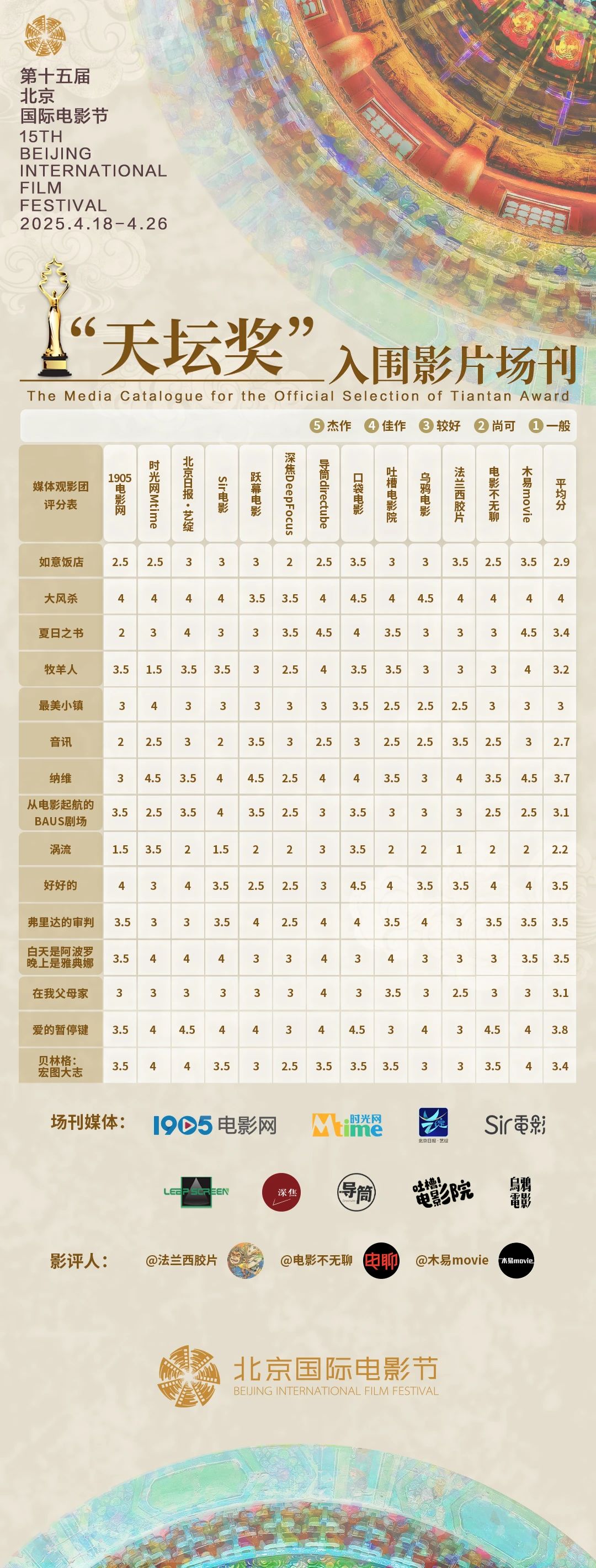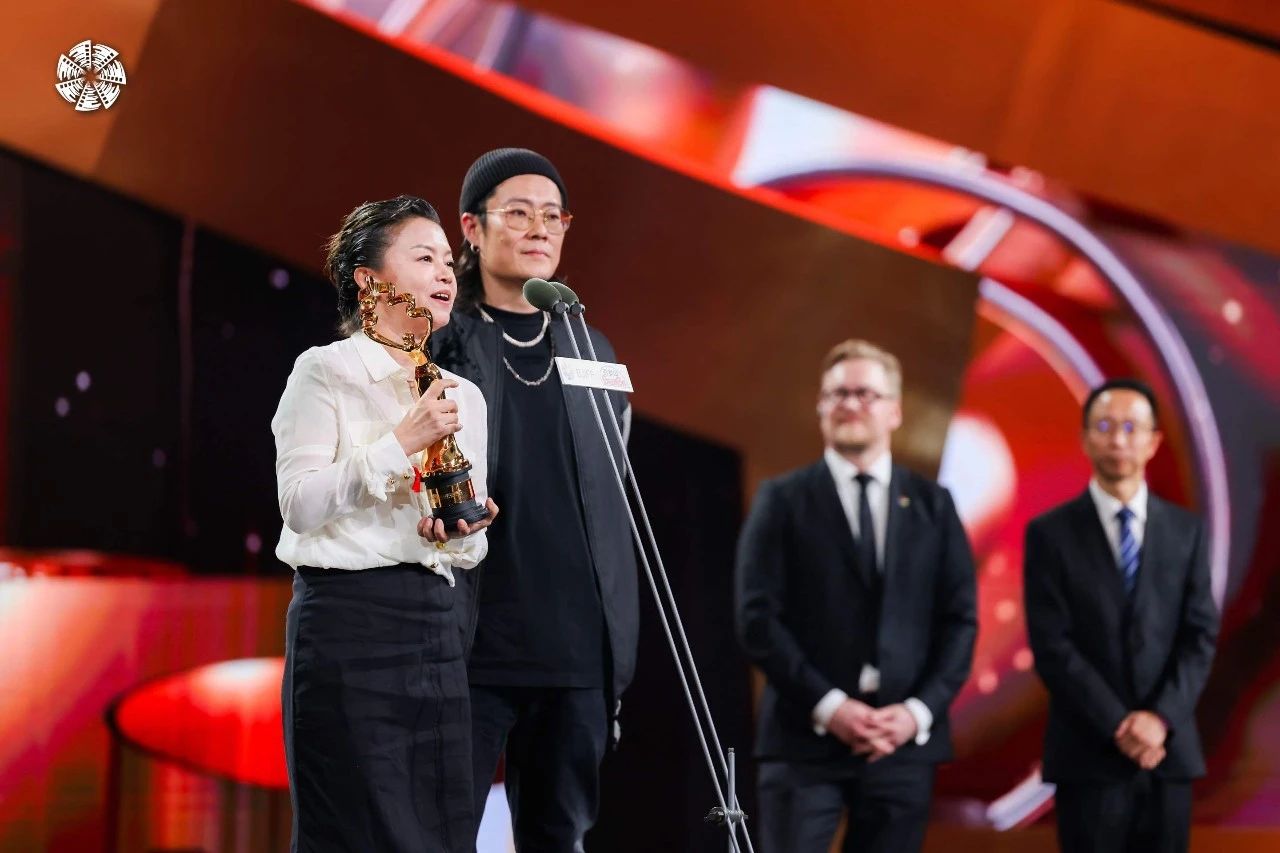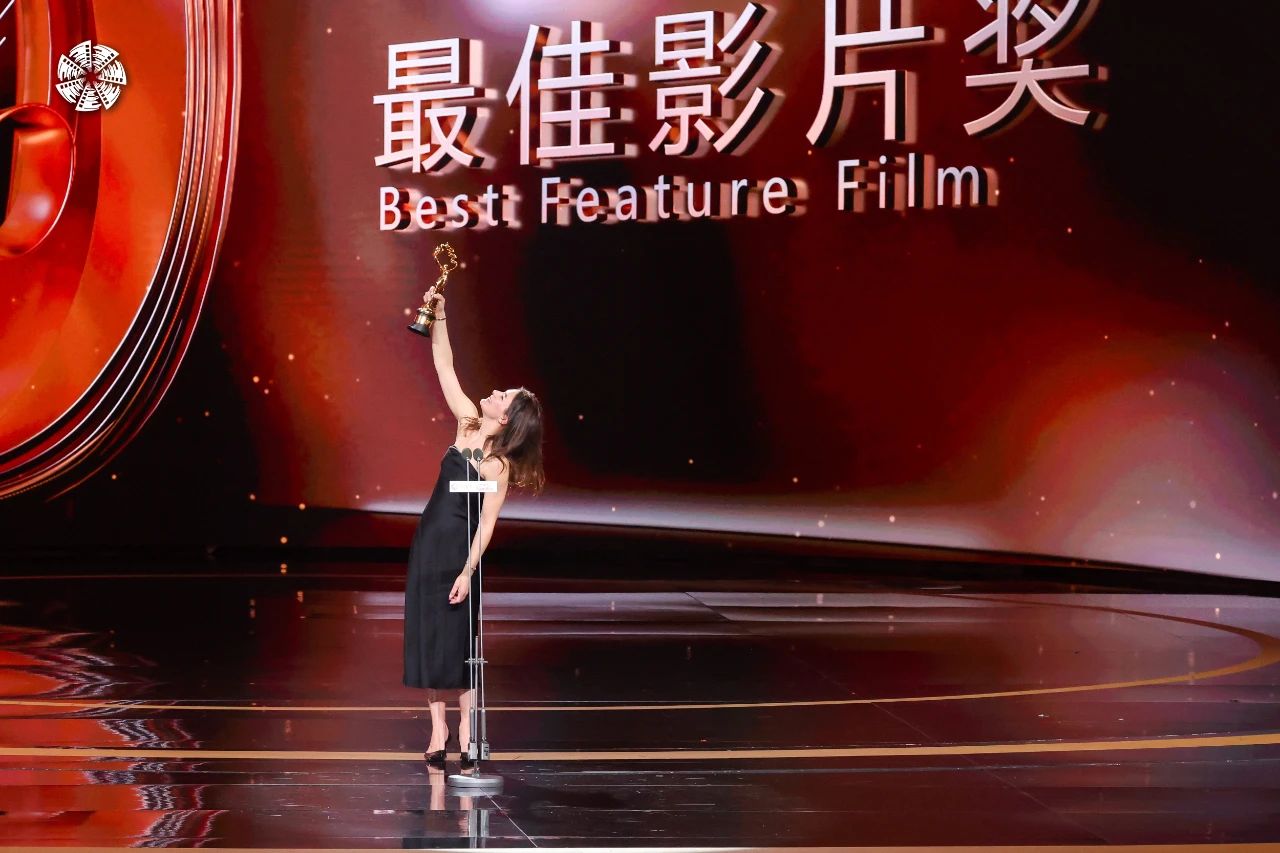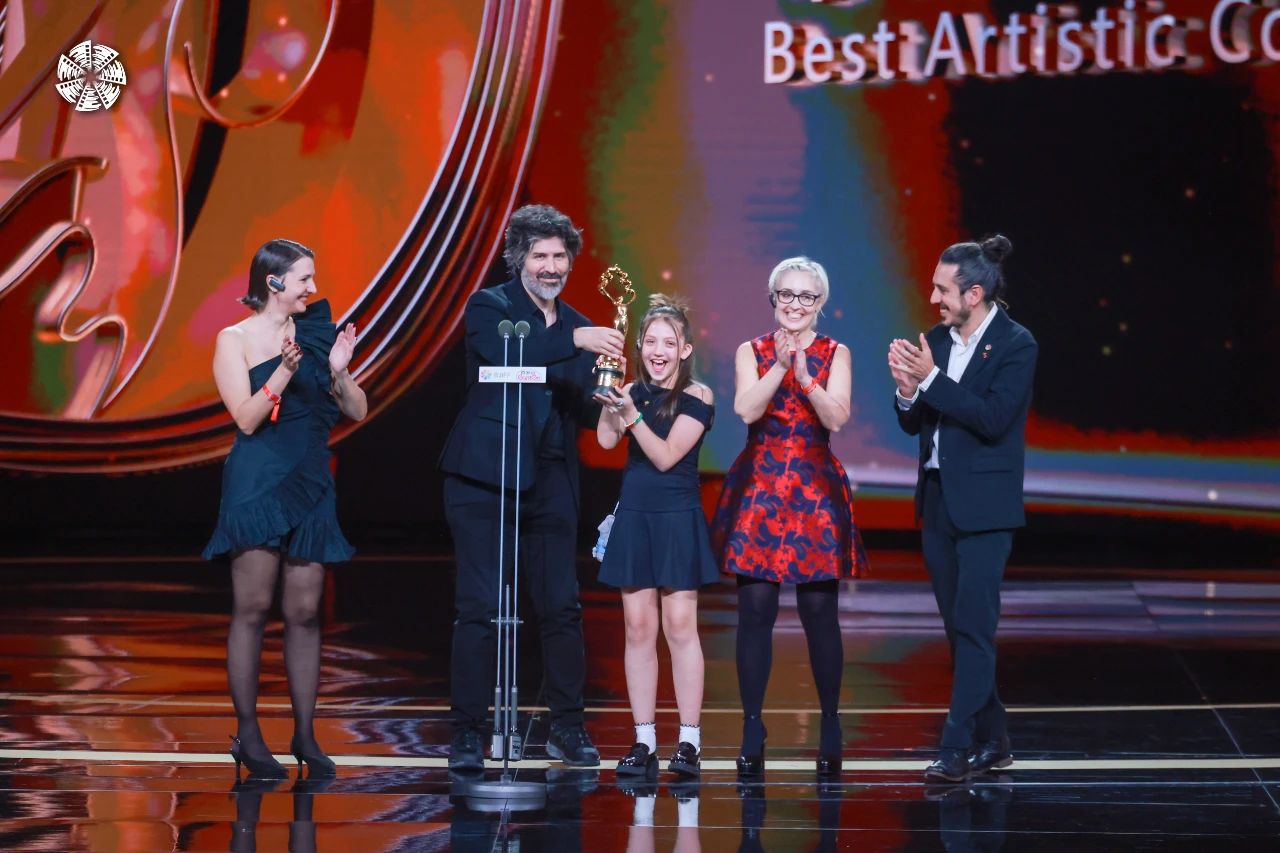Films Shouldn't Be All About Awards: Fifteen Films, One Standard Only
By “Pang Hongbo, Leap Screen”
Agree with the film festival's selection criteria;
Appreciate the film festival's inclusive attitude.
Following my invitation last year to attend the Media Catalogue viewings for the 14th Beijing International Film Festival (BJIFF) official selection of the Tiantan Award, I'm collaborating again with the festival this year.
The strongest impression I have of BJIFF is “respect.” This is especially significant within China's film criticism system, where incidents often escalate into major controversies. It is therefore crucial whether the Media Catalogue can truly maintain its independent perspective. One great thing about BJIFF is that it respects the Media Catalogue's independent views and choices to the greatest extent possible, avoiding turning it into a “praise-only gathering.”
Thanks to BJIFF's professional handling of Media Catalogue screenings, more and more domestic film festivals are starting to prepare their own Media Catalogues.
To me, the Media Catalogue is not meant to be a “crystal ball” predicting the award results; it serves more as a complementary perspective. Last year, the Chinese-language film Gold or Shit emerged as the biggest winner of the Tiantan Award, but it only ranked second in the Media Catalogue's scoring. This year, the Norwegian film Loveable won four awards in a row, but similarly it was rated lower than the Chinese-language film Trapped in the Media Catalogue's rating.
Is this a coincidence? Perhaps, it is because there is a basic “consensus” among the Media Catalogue reviewers, the Jury, and even the audience on what makes a good film. The discrepancy between Media Catalogue scores and final award results is perfectly normal.
Even within the Media Catalogue, since each reviewer scores independently, there's naturally no coordinated “alignment”. Everyone is simply offering their own judgment. Thus, these Media Catalogue notes are not related to who won; they are more of a reflection and summary of my participation from beginning to end.
As an industry commentator, I believe a film festival's focus should extend beyond the few lucky winners. With that in mind, I hope to write a summary piece on the 15 shortlisted films of the Tiantan Award this year from an industry perspective,but this solely represents my personal opinion.

Media Catalogue for the Official Selection of the Tiantan Award
What was the selection standard for the Tiantan Award this year?
Knowing I'd have to write this Media Catalogue roundup after watching all 15 films, the first thing I was curious about was: what exactly is the selection standard for this year's Tiantan Award? Any discussion about impressions must be grounded in a clear standard; otherwise, it's merely personal rambling.
Thanks to the hard work of the BJIFF team, I received a clear answer regarding this year's Tiantan Award selection criteria: the festival aims to showcase films that are both artistically valuable and genuinely enjoyable. In short, films that are “worth watching and easy to understand”.
Anyone who follows film festivals knows that each one has a different positioning, and with different positioning comes a different taste, and thus different standards. Since BJIFF is aiming for films that are “worth watching and easy to understand”, it cannot be made up entirely of highly auteur-driven art films, nor should it consist of formulaic commercial films.
After considerable effort, the BJIFF selection team came up with the 15 films we see today. Naturally, this raises the question: do all 15 films perfectly meet the festival's stated standard?
In my opinion, no. But not because BJIFF lacks consistency. Instead, the reason lies in the fact that every film needs an audience, and a festival has a responsibility to its audience. So when evaluating how well the official selection of the Tiantan Award aligns with the stated criteria, it's more meaningful to look at proportions rather than absolutes.
From that perspective, BJIFF has indeed adhered to its selection standard. And from an industry standpoint, I strongly support this standard. Especially in today's environment, films need to be both worth watching and easy to understand.
What stands out in this year's Tiantan Award?
I see two key themes in this year's Official Selection of the Tiantan Award: directorial debuts and feminism.
The Tiantan Award has always shown a strong preference for young directors, and this year it may have gone to the extreme. By my rough count, 8 of the 15 shortlisted films of the Tiantan Award are feature debuts by their directors, a remarkable ratio.
A few days ago, director Jiang Wen expressed his frustration at formulaic filmmaking during a Jury meeting. But this isn't just his personal sentiment; it reflects a widely shared concern within the industry. The “tedium” of formulaic cinema is a core reason why audiences are losing interest. In contrast, the works of younger filmmakers carry the potential for innovation, otherwise, they might never make it to the screen.
Looking at past Tiantan Award winners, there's also evidence that supporting new voices pays off.
This year's Loveable, which won four major awards, is a debut feature. The film with the Media Catalogue's highest average score, Trapped, is also a debut. Compared to non-debut films, the results speak for themselves: these films are simply good, and that's enough.

Trapped screenwriters Sun Yue and Zhang Qi won Best Screenplay.
That said, the abundance of debut features means that some entries feel less refined in certain aspects. In quite a few of the 15 films, the actual viewing experience falls short of what the director intended to convey. This is entirely normal for debut works, but from a broader perspective, it's something the Tiantan Award might need to consider in future selections.
Starting last year, the Chinese film market has been dubbed a “feminist boom year” thanks to several breakout hits. This year has also seen a few well-received feminist works gain popularity. Behind this surge is a deep audience demand, and creators are also focusing on this. It's a clear directional shift in creation.

Loveable won Best Feature Film
Helga Guren, lead actress of Loveable, accepted the award on behalf of the crew
Several feminist films made it into this year's Tiantan Award lineup, which is partly due to the increasing number of female directors. Still, cinema has long been dominated by male voices, and feminist narratives are far from sufficient. We should encourage more of these works to emerge, whether they're arthouse or commercial.
Similarly, like the problems seen in director's debuts, some feminist films fall into the trap of “feminism for feminism's sake”, or become overly conceptual. In the commercial film market, such issues might be considered normal due to commercial considerations, but when they appear in the Competition Section of a film festival, it becomes questionable.
That said, we fully acknowledge the selection team's professionalism and agree with their approach of applying a clear standard in choosing films.
One quote from the selection team stuck with me: “We hope these films are worth buying a ticket for.”
One last impression I'd like to share: during the post-screening talk for The Message, the cast & crew spoke about Argentina's economic crisis. Despite the crisis, the cast & crew managed to produce last year's The Ant Woman and this year's The Message on very limited budgets, both made it into the Tiantan Award shortlist in consecutive years. This reflects the resilience of Argentine filmmakers.

The Message won Best Artistic Contribution.
These two films share similar qualities: creative, thoughtful, but quite niche. They're certainly worth buying a ticket for, but perhaps not many people actually would.
Over the past five years, the Argentine films that stood out to me, The Delinquents, The Ant Woman, and The Message, are all niche, auteur-driven works ideal for the festival. In contrast, films that are both worth watching and easy to understand like The Secret in Their Eyes, a former Oscar winner for Best Foreign Language Film, and Wild Tales, which was recently released in China, are all from a decade ago.
Now, the global film industry is undergoing massive transformations, and the future of cinema feels uncertain. Revisiting the criteria of “worth watching and easy to understand” brings a bittersweet feeling. Film festivals are still trying to spotlight such films, but is the industry producing them in large numbers?
For BJIFF, the Tiantan Award should have, and only have one standard. Even though selecting films that are both worth watching and easy to understand is a tough task, this foundational logic aligns with the correct direction for industry development. In this regard, considering its role in the development of the current film industry, BJIFF's selection standard goes beyond that of a“Category A” festival. From this point of view, in terms of its role in the development of the current film industry, BJIFF 's film selection criteria go beyond the standards of whether it is an “A-class” film festival.
Where there is film, there is dream. The brilliance never ends. The 6th Beijing Youth Film Festival is on the horizon - stay tuned for more cinematic brilliance!

